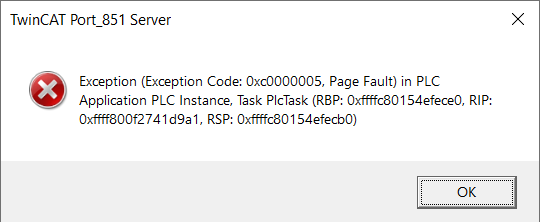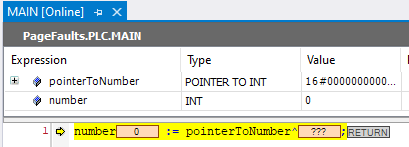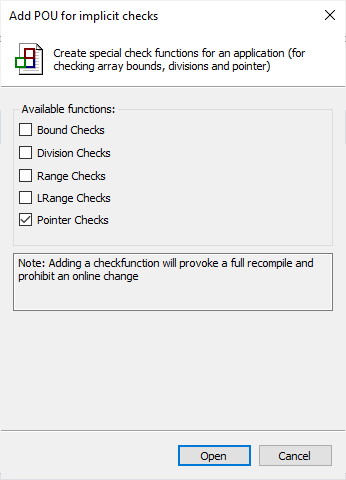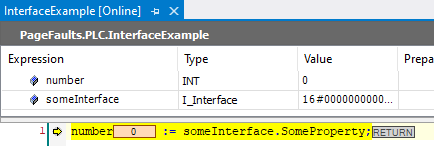Earlier I talked about how you can prevent page faults from references. In this post, I try to show a complete overview of page fault origins and how to prevent them.
- Example code: GitHub/Direct download with TwinCAT 4024.25
Page faults in TwinCAT
You probably came across the following error message when you activated a configuration. The error says there is a Page Fault. This message was always quite puzzling to me when I started programming PLCs.
Exception (Exception Code: Oxc0000005, Page Fault) in PLC Application PLC Instance, Task PlcTask (RBP: Oxffffc80154efece0, RIP: 0xfiff800f2741d9a1, RSP: Oxffffc80154efecb0)
The reason for the page fault is easy to see once you log into your project because it highlights the point of failure.
What are page faults?
Wikipedia lists different types of page faults. I think the ones you get in TwinCAT are of the invalid type. This type of page fault is caused by a reference to an invalid memory address. Let me show through three different examples what that means.
Pointers
Pointers store the address of a variable. When you instantiate a pointer to a variable, the default address is 0. Therefore, in the example below pointerToNumber is 0. Then in the implementation part, I try to save the value to which the pointer points into number by dereferencing the pointer using the ^ symbol.
PROGRAM PointerExample
VAR
pointerToNumber : POINTER TO INT; // 0
number : INT;
END_VAR
number := pointerToNumber^;
When you activate this code you get a page fault. If you log in, you see that the pointer has address 0. Because this is not a valid memory address an exception is raised and your code halts here.
Solution
The solution to prevent this is quite simple: check if the address is 0 before you try to dereference the pointer. The complete example becomes:
PROGRAM PointerExample
VAR
pointerToNumber : POINTER TO INT;
number : INT;
END_VAR
IF pointerToNumber <> 0 THEN
number := pointerToNumber^;
END_IF
Although this solves your issue, there is a good chance that you forget to implement the check at least once. But, you can automatically check for valid pointers with the POU CheckPointer.
The CheckPointer function is automatically called each time before you use a pointer. The advantage is that you can trigger an error message which makes diagnostics easier. A disadvantage is that you add an extra function call when you use a pointer. If you use a lot of pointers, the extra overhead might cause cycle overruns. Also, it can’t prevent the pointer call, so you get the page fault regardless.
To add the CheckPointer to your project, right click your PLC project and select Add > POU for implicit checks.
Select Pointer Check and confirm with Open.
This adds the CheckPointer function to your project and it already has a suggested implementation. If I run the failing example code, an error message is printed in the error console before it crashes.
Another solution would be to pass the pointer via VAR_IN_OUT or use constructor injection via FB_init as I showed in the earlier article.
References
Another way you can get page faults is through references, as I also showed in an earlier article. References are pointers with an improved interface. Thus it shouldn’t come as a surprise that these can cause page faults as well.
The short example below causes a page fault: I instantiate a reference to an integer called number. Then I try to assign a number to this reference.
PROGRAM ReferenceExample
VAR
refNumber : REFERENCE TO INT;
END_VAR
refNumber := 1;
When you try to assign a number to this reference, you get a page fault, because refNumber doesn’t refer to anything.
Solution
In the earlier article I showed several ways you can prevent page faults from references. They were using:
__ISVALIDREF- Adding references to
VAR_IN_OUT - Or using constructor injection via
FB_init
Here I only show the first solution with __ISVALIDREF. You use this function in a similar was as you would with the pointer check (somePointer <> 0): The full example becomes.
PROGRAM ReferenceExample
VAR
refNumber : REFERENCE TO INT;
END_VAR
IF __ISVALIDREF(refNumber) THEN
refNumber := 1;
END_IF
The advantage of this is that you prevent page faults. But the reference never gets assigned, thus you might wonder why your code doesn’t do what you expect it to. In this case, it’s probably a good idea to add an ELSE clause with an appropriate error message. Even better would be to pass the reference via VAR_IN_OUT or FB_init if possible.
Interfaces
Interfaces can also cause page faults as shown by this example. I defined an interface I_Interface with a single property called SomeProperty which returns an integer.
INTERFACE I_Interface
PROPERTY SomeProperty : INT
I create an instance someInterface of I_Interface. Then I try to save the integer returned by this into the variable number.
PROGRAM InterfaceExample
VAR
number : INT;
someInterface : I_Interface;
END_VAR
number := someInterface.SomeProperty;
Executing the code again results in a page fault. That is because a function block needs to be assigned to the interface first. Then someInterface contains the address to this function block. Without an assigned function block, the interface is 0. Since this is not a valid address you get a page fault.
Solutions
The solution to preventing page faults from invalid interfaces is the same as for pointers: before you use the interface, check if it’s not 0.
PROGRAM InterfaceExample
VAR
number : INT;
someInterface : I_Interface;
END_VAR
IF someInterface <> 0 THEN
number := someInterface.SomeProperty;
END_IF
Again this solution silently fail, thus it might be wise to add an ELSE clause with an error message. Or if you use the interface in a function or function block you can use the VAR_IN_OUT or FB_init solutions mentioned in the earlier article.
Conclusions
I showed page faults can be caused by invalid pointers, references, and interfaces. For each case, I showed some solutions how to prevent the page faults, mainly by checking if the pointer or interface is not 0 or by using __iSVALIDREF for references.
Did I miss any cases which can cause page faults and what are your solutions to prevent PLC crashes from page faults? Let me know in the comments below.






